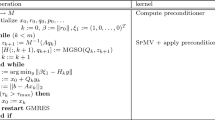Abstract
The convergence of the Krylov subspace methods is affected by round-off errors. The number of iterations until convergence may be decreased by reducing round-off errors through the use of quadruple precision arithmetic instead of double precision. We implemented the CG and BiCGStab methods using quadruple precision arithmetic and compared the performance with the standard double precision implementations on an NVIDIA Tesla K20X GPU. Our results show that in some cases our implementations using quadruple precision arithmetic outperform the double precision versions. We will show that quadruple precision arithmetic is not costly for the CG and BiCGStab methods on GPUs and the use of quadruple precision arithmetic may be a more effective alternative to the use of preconditioning.
Access this chapter
Tax calculation will be finalised at checkout
Purchases are for personal use only
Similar content being viewed by others
References
Bailey, D.H.: QD (C++/Fortran-90 double-double and quad-double package). http://crd.lbl.gov/~dhbailey/mpdist/
Barrett, R., Berry, M., Chan, T.F., Demmel, J., Donato, J., Dongarra, J., Eijkhout, V., Pozo, R., Romine, C., der Vorst, H.V.: Templates for the Solution of Linear Systems: Building Blocks for Iterative Methods, 2nd edn. SIAM, Philadelphia (1994)
Bell, N., Garland, M.: Efficient sparse matrix-vector multiplication on CUDA. NVIDIA Technical Report NVR-2008-004 (2008)
Davis, T., Hu, Y.: The University of Florida Sparse Matrix Collection. http://www.cise.ufl.edu/research/sparse/matrices/
Dekker, T.J.: A floating-point technique for extending the available precision. Numer. Math. 18, 224–242 (1971)
Furuichi, M., May, D., Tackley, P.: Development of a stokes flow solver robust to large viscosity jumps using a schur complement approach with mixed precision arithmetic. J. Comput. Phys. 230(24), 8835–8851 (2011)
Gravvanis, G., Filelis-Papadopoulos, C., Giannoutakis, K.: Solving finite difference linear systems on GPUs: CUDA based parallel explicit preconditioned biconjugate conjugate gradient type methods. J. Supercomput. 61(3), 590–604 (2012)
Hasegawa, H.: Utilizing the quadruple-precision floating-point arithmetic operation for the Krylov Subspace Methods. In: Proceedings of the SIAM Conference on Applied Linear Algebra (LA03) (2003)
IEEE Computer Society: IEEE Standard for Floating-Point Arithmetic. IEEE Std 754-2008, pp. 1–58 (2008)
Mukunoki, D., Takahashi, D.: Implementation and evaluation of triple precision BLAS subroutines on GPUs. In: Proceedings of the 2012 IEEE 26th International Parallel and Distributed Processing Symposium Workshops & PhD Forum (IPDPSW 2012), The 13th Workshop on Parallel and Distributed Scientific and Engineering, Computing (PDSEC-12), pp. 1378–1386 (2012)
Naumov, M.: Incomplete-LU and Cholesky Preconditioned Iterative Methods Using CUSPARSE and CUBLAS. NVIDIA White Paper, \({\rm WP}-06720-001\_{\rm v}5.5\) (2013)
NVIDIA Corporation: CUBLAS Library. https://developer.nvidia.com/cublas
NVIDIA Corporation: cuSPARSE Library. https://developer.nvidia.com/cusparse
Reguly, I., Giles, M.: Efficient sparse matrix-vector multiplication on cache-based GPUs. In: Proceedings of the Innovative Parallel Computing: Foundations and Applications of GPU, Manycore, and Heterogeneous Systems (InPar 2012), pp. 1–12 (2012)
Saito, T., Ishiwata, E., Hasegawa, H.: Analysis of the GCR method with mixed precision arithmetic using QuPAT. J. Comput. Sci. 3(3), 87–91 (2012)
Acknowledgment
This research was supported by JST, CREST.
Author information
Authors and Affiliations
Corresponding author
Editor information
Editors and Affiliations
Rights and permissions
Copyright information
© 2014 Springer-Verlag Berlin Heidelberg
About this paper
Cite this paper
Mukunoki, D., Takahashi, D. (2014). Using Quadruple Precision Arithmetic to Accelerate Krylov Subspace Methods on GPUs. In: Wyrzykowski, R., Dongarra, J., Karczewski, K., Waśniewski, J. (eds) Parallel Processing and Applied Mathematics. PPAM 2013. Lecture Notes in Computer Science(), vol 8384. Springer, Berlin, Heidelberg. https://doi.org/10.1007/978-3-642-55224-3_59
Download citation
DOI: https://doi.org/10.1007/978-3-642-55224-3_59
Published:
Publisher Name: Springer, Berlin, Heidelberg
Print ISBN: 978-3-642-55223-6
Online ISBN: 978-3-642-55224-3
eBook Packages: Computer ScienceComputer Science (R0)




